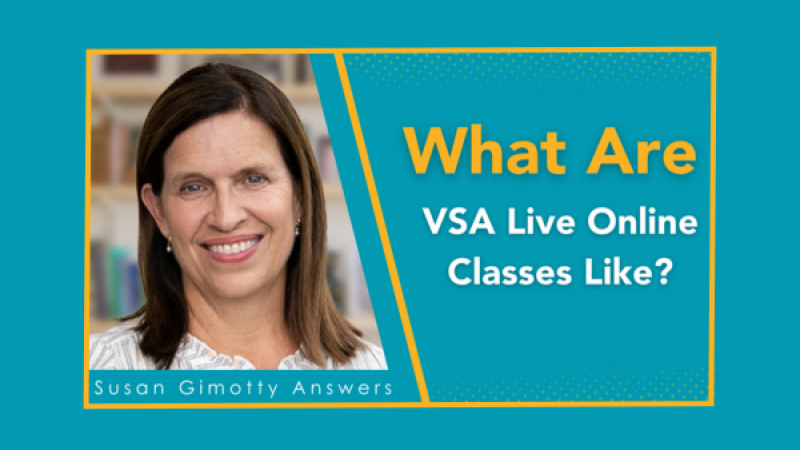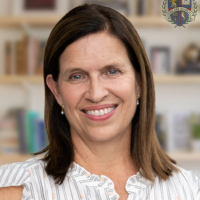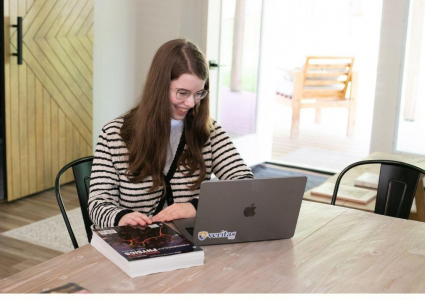Veritas Scholars Academy Live Classes | The Nitty Gritty of Homeschooling High School.

Transcription
Note: This transcription may vary from the words used in the original video for better readability.
Live Classes
So this is where we really start with the nitty-gritty of homeschooling high schoolers. I'm going to explain what live classes can look like. There's a lot on this slide, but this is if you take one picture, this is the picture I would take if you are new to Veritas.
So you can take live classes with us as a full-time or part-time student. So what that means is if you are homeschooling your high schooler and you don't want to teach chemistry and you would rather an expert teach it, you could come to us and take one class of chemistry or a full-time student would take five or six classes with us and a full-time student would be seeking a diploma, a graduation, a transcript, all of that.
But the rules are the same for these live classes, whether you're full-time or part-time. So I'm just going to go over what a live class looks like and what you could expect. So as I mentioned, we have students from all over the world. We offer live classes from third through 12th grade. We offer school year classes and we offer summer classes.
The Virtual Classroom
We have about 160 expert teachers in the virtual classrooms using an impressive curriculum. So the virtual classroom looks just like this. So the teacher would be on webcam just like I am, and you would be as if you are a student and I would be as a teacher. I would be engaging you. Today I'm kind of just lecturing. That is not really what the classroom is going to look like most of the time. I would be calling out “Liz, can you tell me the answer to question number five,” or, “Sally, what did you think about Frankenstein and Shelley's viewpoint on education?” That’s going to be when Sally would hop on a webcam, hop on mic and answer that.
Or maybe I'm a math teacher. I would just put a simple problem on the board like this. And I would say, “Who can solve for X?” And so I bet all of you in this classroom could solve for X and you could put that answer right in the chat box. Let's see, we got anybody who can solve for X? All right, We got Jacqueline.
She's in first. Thank you! We solved for X. So that's how the classroom becomes very interactive and you can see how the responses are quick. Dion, one of my fellow academic advisors, she's putting several good links in the chat box. Notice the first one she put is our history trips. That picture I showed you more about academic advisors, our faculty and our course catalog.
So you'll see hers are in peach color and those are going to be links that apply to some things that I'm saying. Okay. All right. Thank you for solving my 3x=6.
University Model
So next we have its university model. What does that mean? That means we meet twice a week for an hour and a half each. So your classes, that would either be Monday/Wednesday or Tuesday/Thursday. We have no live classes on Friday. Friday is for your student to do projects, test labs, papers, etc. So maybe your class might start at 8 a.m. and it would meet until 9:30 and it would meet maybe Monday and Wednesday or Tuesday and Thursday if you take a full load with us, usually you take 5 to 6 classes and usually you'll do like three a day.
So my kids would take like three classes in a row or maybe they want to take two classes and then have a lunch break. When my four kids were in full-time diploma, all in seven through 12, there were years that we were taking 25 live courses between the four kids. So it can be done even with big families doing a lot of classes.
We estimate that your student will need to spend 3 to 6 hours outside of the classroom per week for homework projects. Tests, quizzes, papers. You know, some weeks it's going to be less and some weeks will be kind of more, etc.
Participation Matters
A big part of your grade in the live classroom is participation. Participation matters here at Veritas. So that helps to know that you're paying the bill and your student is not just hopping on Minecraft for an hour and a half zoning out, because your student will be called on. And also we have engagement meters that are embedded into our classroom that help the teacher know how many times Johnny answered a question or how many times Johnny put an answer in the chat box, things like that.
So participation matters. Your student will be getting comments from their teacher. If they aren't participating, they might get a message from their teacher. “Hey, just checking in. I notice I called on you a couple of times recently and you haven't said anything. I wanted to make sure everything is okay.” That's what you can expect here at Veritas.
Course Assignment Sheets
One of the things that really sets us apart is this next one, and that is our Course Assignment Sheets, affectionately known as CAS. Now, if you are a planner like I am, I like to know what we're doing today, but also what we're doing next week or next month. The Course Assignment Sheet is broken down per quarter and it shows every single assignment your student will have.
And pretty much the teacher locks into this and that is what you can expect. This is beautiful. Like if maybe you're going to plan a college visit. And I kind of look at the course assignment sheets and I'm looking for kind of a lean week so that we could cut away maybe for three or four days and do a college visit with my youngest daughter, things like that.
Taught by Passionate Teachers
I would say one of my favorite things about live classes is the ability for your student to be mentored by other adults. There comes a time in our life as parents where we admit and see that other adults can take our student further than we can. I think it starts in little subject areas. For example, when my kids were little, I'm actually kind of crafty, but I don't really like a mess. And so I knew my shortcomings and that was my kids were not going to get very much art because I don't really like a mess and I don't want to get out all that stuff. So I actually hired an art teacher to come in every other week for an hour to do some fun art project with my four kids because I knew my limitations.
Well, eventually, as you get to high school, you realize your limitations because you might hate math and the last thing you want to do is project that on your kid. Or history might not be your thing. So these 160 expert teachers, they love what they do. They love their discipline, They love the history, they love the math, they love the chemistry, and they will light that fire under your student probably better than you can.
Grading by Teachers
Another thing is the teacher's going to grade your student's work and offer comments. So fun story. When my oldest Michael, was in second grade and I would mark things wrong on his little workbook, he came to me one day and said, “Mommy, if I correct my answers, could you white out your red X's?” And at that moment I knew I had a bit of a perfectionist on my hands.
Well, guess what? You don't have to do the grading anymore. And I particularly love that when it comes to subjective areas like writing, because I don't know about you and your relationship with your kids, but my kids are okay if I can show them in the answer key why their math problem is wrong. But when it's subjective and I say this sentence is awkward or this thesis is not strong enough, they're like, “Well, why isn't it? I don't think it's awkward.” But when an expert teacher tells them that, then they're like, “Okay, I need to reword this. I need to think through it.”
So that is what these live classes can offer you, is the ability to be mentored by other adults and for teachers to be grading their work.
One of my daughter's science teachers last year just would message me probably once a quarter and just blow wind into my daughter's sales of how well she was doing in this high-level science class and how she had a mind for science and I think is probably the first time she had really heard that and was even considering a science major in college because of this particular teacher's comments towards my daughter.
Ability to Build Community
The last thing that I feel like live classes offer is the ability to build community. Back to my story on Michael praying for his classmate in Bahrain. There will be community built in two weeks. One of my daughter's friends is coming to visit us in Kansas City. All of my kids have hooked up in some way with other Veritas families all over the country. You know, where we find ourselves in Florida and we're like, Oh, my golfer son Nicholas, he has a Veritas friend in Orlando. So we usually try to hook up and maybe they'll play a round of golf together or something like that.
And then lastly is to attend the EOYG. EOYG stands for End of Year Gathering and that is when we come together as a huge school and we have kind of a five-day conference in Lancaster, Pennsylvania, which is where our headquarters is, and we just have a blast, we have graduation, we have a dance, we have field trips, we have luncheons, a mom's tea, it's super fun.
And my particular family, we have gone now 12 years in a row, minus one year for COVID. So my kids love to meet their teachers in person and meet their classmates, hang out with their classmates and all of that. So that is a pretty exhaustive list of what live classes, what they look like at Veritas. Notice this picture is similar to what we have just kind of the canvas is situated a little differently, but that's just up to the teacher.
So one teacher lecturing with a lot of students participating. And then we oftentimes like to take these class photos and you'll see this is a class, an Omnibus class, one of our history courses. And just fun to see what each time they read a new book, the teacher asks them to show it on webcam. So they all go on webcam together and then the teacher clicks a quick picture.
So that's an overview of full-time and part-time live classes again. You can take one, you can take two, you can take six. We don't care. But we feel like once you start taking them, usually your student will be like, “Man mom, I love you, but I would rather take it live with somebody else.”







